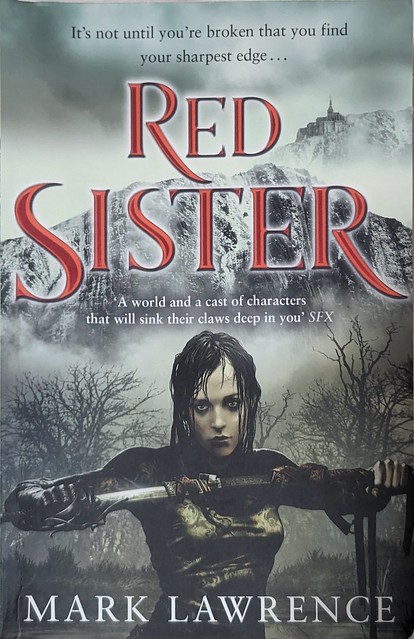 Red Sister by Mark Lawrence isn't dreadful sci-fi nonsense, because it isn't sci-fi; it's closer to fantasy. Teenage wish-fulfilment fantasy. That doesn't of itself make it bad; after all Harry Potter is much the same. I got this because I've been reading - and enjoying - The Book That Wouldn’t Burn - in W/S, and felt like buying something on a Friday to last the weekend.
Red Sister by Mark Lawrence isn't dreadful sci-fi nonsense, because it isn't sci-fi; it's closer to fantasy. Teenage wish-fulfilment fantasy. That doesn't of itself make it bad; after all Harry Potter is much the same. I got this because I've been reading - and enjoying - The Book That Wouldn’t Burn - in W/S, and felt like buying something on a Friday to last the weekend.And this is not-dissimilar let us say; I'll probably cover this ground better when reviewing that, but this one, like that one, is "poor but talented girl grows up in strange new environment making friends and dealing with the oppression of the powerful".
Before going on, and without yet revealing much in the way of spoilers, but those will come later, I note that the "defining event of the start" - her rescue of her friend, which causes her to suffer the emnity of the powerful, and leads to her friend's death - is a classic "you don't know how to fail" a-la HPMOR: somewhere in the middle of that (if you haven't read it, do so now, it is well worth it) Voldemort tries to explain to Harry that instead of a bizarre sequence of ever-less-plausible and ever-more-risky victories for ever-higher-stakes, it would have been much better, and nearly painless, to simply fail at the first hurdle. This doesn't suit well with modern Western thinking where all must have justice down the the last jot and tittle.
While I'm here - wherever I am - I'll also point out that spoiled-beautiful-rich-kid Arabella doesn't last very long in that role before being granted the inevitable promotion to friend. It felt that the book, knowing it was inevitably going to follow the trope, couldn't be bothered to go through all the motions and just cut things short.
Moving on to some good bits - after all I did read it - the world building is fun. It is a cold world, with extensive ice sheets, and a thin "corridor" of habitable land on the equator. Implicitly, it is orbiting a red dwarf - the sun is described as filling half the sky, though I'm not sure that quite works, never mind. But would such a corridor be stable? No, but that's OK, because there is a "focus moon" that briefly warms the night; it becomes clear this is a space mirror; and this seems plausible. But then, aha, it turns out that part of the plot is going to be control of some mystical tech that can control the mirror. Nice.
The rest of the mystical powers, and the four sorts of them, from the four sorts of original inhabitants, is also quite well done. And a bit blurred, as it must be.
As I said, this is really isomorphic to a girls-own-adventure, but - perhaps as so often with these things - that leads to oddities: when their lives are threatened they take it with the light-heartedness that they would were it the end-of-term hockey match. Oh yeah, and the character-shifts of, say, Sister Apple / Poisoner don't quite work.
Grey Sister
Not quite deserving its own review is the sequel, Grey Sister. More of the same. Even, wittily, to the invention of "Joelli" to take the place of "Arabella" to be the Mean Girl, now that Ara is one of the gang. The enemies-within-the-empire grow more implausible, as it becomes necessary to find someone to find; we haven't really met the enemies without. I even started Holy Sister the end (let us hope) of the trilogy, but I doubt I go further.
No comments:
Post a Comment